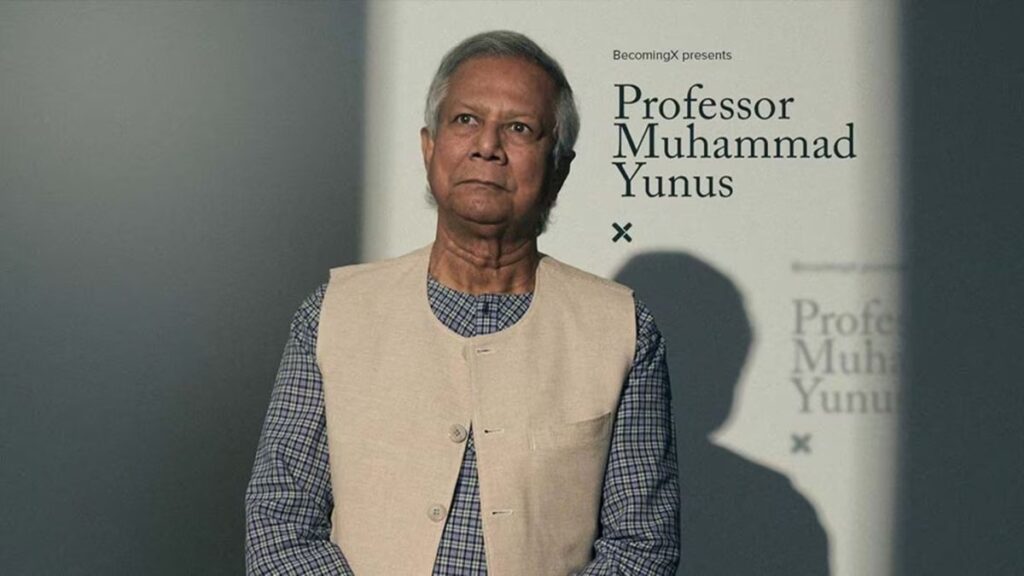Growing up outside Bangladesh, my connection to my homeland often came through the stories of its remarkable individuals. I first learned about Professor Muhammad Yunus’s microcredit program as part of my school’s Economics curriculum in India and felt immense pride when we discussed it in class. His pioneering work in microcredit has not only transformed countless lives in Bangladesh but has also garnered international acclaim.
To many around the world, Professor Yunus is synonymous with Bangladesh, and rightly so. His theory of microfinance is taught globally, symbolizing hope and innovation.
For me, it is a source of immense pride to see such a distinguished figure leading our nation; his ascension to leadership represents what can only be described as karmic justice.
In recent years, Sheikh Hasina’s government launched an aggressive campaign against Professor Yunus. With over 180 cases filed against him, it was clear that the intent was to discredit and undermine his legacy.
The legal system was weaponized to haunt him and his colleagues, to the point where it seemed the goal was to tarnish his contributions and drive him to despair.
This barrage of legal attacks was not merely about resolving disputes but about erasing his impact on society and the world stage. In fact, the sheer volume and nature of these legal challenges suggest that the intent was not to resolve specific disputes but to inflict professional damage. This approach has raised significant concerns about the misuse of the legal system for political ends, undermining the principles of justice and fairness.
This aggressive campaign also managed to create a perception of political repression and abuse of power. International observers and human rights organizations have frequently criticized the treatment of Yunus, viewing it as a sign of deteriorating democratic norms and respect for individual rights in Bangladesh. Persecuting a Nobel laureate reflects poorly on our governance, showing a willingness to sacrifice the reputation and contributions of one of its most respected figures for political gain. However, despite the relentless pressure and politically motivated harassment, his resolve remained unshaken. His pioneering work in microcredit, which has lifted millions out of poverty, became a shield against these attacks. The very principles that helped him build a global legacy of change became his defense against the forces working to dismantle his work.
The turning point came on August 5, when Sheikh Hasina resigned as Prime Minister, facing accountability for recent violence and loss of life under her administration. The collapse of her government marked a significant shift in the political landscape of Bangladesh. In a dramatic and symbolic turn of events, Professor Yunus was appointed as the leader of the interim government the following day. This transition is a striking example of poetic justice, where the relentless pursuit against him was met with a profound reversal.
Professor Yunus steps in at a time when Bangladesh is grappling with multiple crises—economic instability, social inequality, and political turmoil—yet his ascension to the highest office is a beacon of hope.
His leadership promises a renewed focus on inclusive economic development, social justice, and the eradication of poverty. With his academic excellence and international recognition, he brings a wealth of knowledge and experience that is sorely needed in Bangladesh’s governance. Our economy has faced significant challenges in recent years, exacerbated by political instability and corruption.
Professor Yunus’s leadership offers a unique opportunity to address these issues head-on.
His deep understanding of grassroots economic development and his commitment to social business principles can help steer the country towards a more sustainable and equitable economic future.
Moreover, his international stature and network of global supporters can enhance our standing on the world stage. His extensive network of global collaborators can facilitate valuable resources and expertise, aiding national development. It is not just his policies that inspire confidence but also his personal story of resilience and integrity. For many, including myself, his leadership is a source of immense pride and hope.
There will undoubtedly be challenges ahead. We need to remember that this is the rebirth of a nation, and it will take time for things to fall into place. But if there is anyone who can navigate these complexities, it is Professor Yunus. His entire career has been about finding innovative solutions to seemingly insurmountable problems. His transformative leadership offers a chance for a fresh start, a new direction that prioritizes the well-being of the nation as a whole. It promises to bring a renewed focus on inclusive development, social equity, and economic growth. As Bangladesh enters this new era, Professor Yunus’s appointment represents not only a strategic response to current challenges but also a profound opportunity for the nation to advance towards a more equitable and prosperous future. The question of whether Bangladesh treated its sole Nobel laureate right has always been a troubling one. As we now prepare to witness his leadership, there is hope that his tenure will mark a new chapter in Bangladesh’s history—one defined by integrity, inclusivity, and progress.

